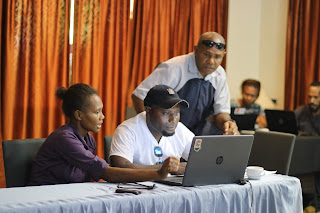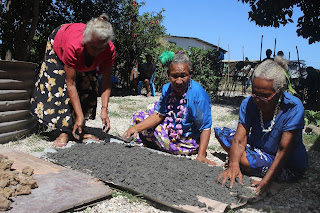EAST NEW BRITAINs PLAN TO COMBAT COVID19
And like any other province, it shut its
doors to the rest of the country to deal with the local transmission and the
two positive cases that were reported.
The bustling commercial hub of the New
Guinea Islands came to a halt, causing fear and anxiety among its citizens. All
business houses closed their doors except for essential service providers.
State of Emergency Controller and
Provincial administrator Wilson Matava said it was not easy to go into lockdown.
’’When you lockdown services, stop
transportation, food, and medical supply, this is something else. This
situation caused fear and it was something we couldn’t control. our people were
not ready for the lockdown and it was a huge challenge. We quickly learned from
the first case and with close collaboration with the medical team we developed
our protocols,’’ said Mr. Matava.
’’Learning from those challenges, my
team with the medical team set-up 8 sub-teams, that included communication
& Awareness so we can respond immediately in terms of surveillance, awareness,
and education. That was very important for us to empower our people during that
time of panic. The only solution and approach for us were in education and
awareness, we targeted our security team, medical officers, public servants,
and politicians. We had to get support from our NOC team in Moresby, from the
world bank and other support, we beefed up our awareness team. I am very
thankful that NBC during that time played a very important role especially our
local team here, in support of my local team providing information to the whole
of ENB’’.
The Administration started developing its
protocols, mobilizing their local pastors, community leaders, government
officers, and others to continue awareness and education programs for their
people.
Commitments were made by their local
leaders to continue supporting different sectors to keep them afloat. And have
worked with each of them to improve and develop their health and hygiene
standards
’’Stigma was a big challenge, we had to
take a different approach and that is, adopt our cultures and traditions and
what we believe in as a Christian nation and out of love and respect for each
other. The challenges were immense, and we had to allow our industries to
operate, our people to sell their copra, cocoa, balsa.’’
‘’ There
are various economic challenges, our SMEs was hard hit also, especially our
women who sell artifacts and garden produce''. But we also made sure our industries
were operating and complied by developing their own health, hygiene, and safety
standards and could operate within their estates. We had to work with them.
While the task force team was planning and
re-strategizing, the people on the other hand went back to farm their land. An
opportunity this pandemic has brought.
‘’I saw this as an opportunity to go
back and farm my land, look at my cocoa farm, and re-strategize ways to earn an
income. A lot of people panicked and had their version of tales, but I trusted
God and was not worried about what people were saying. I did my part by following
the covid protocols and obeying the rules and for that two weeks of lockdown
paid off’’. Henry Tikura – Cocoa Farmer, Burit Ward, Vunapalading.
NBCTV team talking to Henry Tikura, a Cocoa farmer in Burit Ward, Vunapalading.
‘’We did not waste time when the first
lockdown came into effect. We were in tune with our land. We continued
planting, pruning, and taking care of our cocoa farms. While we were doing
cocoa farming, we were also planting garden food. After the lockdown was uplifted,
we had a surplus of food and we harvested our cocoa farm twice. This encouraged
us to continue doing more’’’, Betty Tikura, Burit Ward, Vunapalading.
''Í joined my aunties, mother, and went
into cocoa farming as well. Normally I will be with my peers, brewing and
drinking homebrew and causing a lot of nuisance among our communities, but this
time, the situation grounded me. I surprised myself and I’m grateful that I
managed to plant good hectares of cocoa and peanuts’’, Kelly, Youth farmer of
Burit, Vunapalading.
The people are resilient and in fact, they
are the very people that lived through disasters that wiped out their townships
and villages, they are known for their resilience and sense of community to
come back from the difficult circumstance.
Mr. Matava said; ‘’We had a surplus
supply of fresh produce. The Bainings and Pomios supplied fresh produce. There was
assistance from Manus, Papuan, Chinese, and other ethnic communities, they all
stood together and supplied food to our people. There were mixed reactions as
to how people will recover. But They are resilient, they survived the 1994
eruptions, floods, and other natural disasters and still stood together. The
churches played a major role in bringing peace and order. Our leaders stood
together.''
Cocoa Board officer talking to farmers in Naparpar.
When the lockdown was up lifted business was back to normal, but measures were put in place for the people to adhere to. The task force team encouraged locals to sell their produce at the roadside. Opening more economic opportunities for the farmers, entrepreneurs, and local SMEs to flourish during this period.
One such local SME was Mauke Island Retreat.
’’We had a strategy in place to keep us
afloat and that was the involvement of youths encouraging them to take
ownership of their resources and part take in small business opportunities. They
brought in food and we bought it from them. We targeted local people to promote
tourism,’’ said Justin Kuradal.
‘’Duke of York Island is doing very well
with regards to eco-tourism. They changed their approach and were targeting
local tourists and people have been going there. We are assisting them by
assessing their products and providing materials. Most of the setup is basic
but good. Different sectors are doing their bit and for us in the tourism sector,
we are working closely with the market authority and other line agencies. We
will get there, it is a matter of time’’, Gard Renson, CEO ENB Tourism
Authority.
‘’We have a plan as a government, its
called and Economic Development Plan (EDP) and Urban Regional Planning (URP)
established service center away from disaster-prone areas. We did not initiate
new policies, there were reference points in terms of relocations, approaches,
and strategies and how we can mitigate provided local solutions in times of
challenges like this.’’
We have existing systems such as the 3
layers of government levels and will be working directing with the ward councilors,
presidents, and the churches to equip them so they handle issues such as this
and others. Those are just some of our plans. Id like to thank all
stakeholders, business houses, expatriate communities, our people from other
provinces, and many others. Their assistance made a difference in the
province.''
END!








Comments
Post a Comment